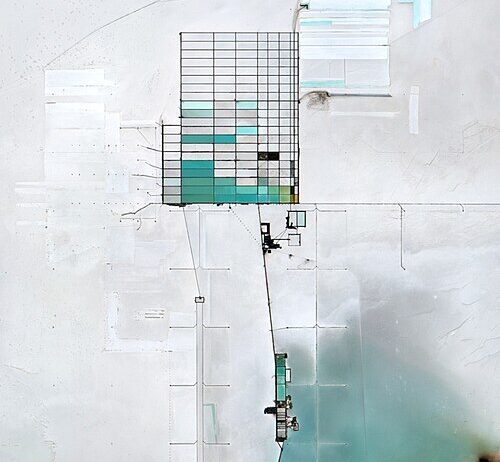Serena Clark recently finished a consultancy at the International Organization for Migration (IOM), UN Migration. She recently completed a postdoctoral research fellowship at Maynooth University. She holds a doctorate in global politics from Trinity College Dublin, where she was a Rotary Global Grant Scholar.
Introduction
The contemporary relationship between states and migration is complicated, and the democratic governance of migration continues to be a challenge for many states, including Ireland. The world’s more than 100 million displaced people are commonly from places where stable state institutions’ infrastructures have failed or are absent, and recipient countries must manage (or fail to manage) massive inflows of migrants, which often causes cultural backlash and exclusionary attitudes arising from anti-immigrant and nationalist or populist movements. Recent decades have seen a global rise in far-right groups and the normalization of extremism in political discourse surrounding migration.
Over the past year in Ireland, inward migration has significantly grown, primarily from Ukraine, with an average of 700 Ukrainian nationals arriving per week and over 74,000 now living in the country. At the same time, since the beginning of November 2022, Ireland has experienced unprecedented anti-immigrant protests driven by a housing crisis, insufficient essential government services, and racially charged rumors disseminated through social media platforms. With these dynamics, migration is becoming increasingly contentious, intensifying national divisions and frequently leaving refugees and asylum seekers to face an uncertain future. Against this backdrop, Ireland must reconsider its migration-management strategies and take a “from-below” approach that incorporates the perspectives and interests of these groups in policy decision-making.
Like many other states, migration policies in Ireland are written from state-centric perspectives, with minimal (if any) consultation from refugees and asylum seekers. As a result, the government habitually fails to meet the needs of these groups. Refugees’ and asylum seekers’ participation is often limited to ad hoc consultations that do not enable them to considerably influence the direction of the policies affecting their lives. For example, in 2020, an advisory group to the Irish government on migration strategy planned to speak with refugees and asylum seekers, but due to COVID-19, the group only spoke to a small number of people living in Athlone and Galway. Previously, in 2004, the Irish government’s Reception and Integration Agencies held a small forum with only fifty refugees to discuss integration into Irish society. Instead of these ad hoc consultations, the Irish government must enable ongoing access to decision-making spaces for refugees and asylum seekers. Because they experience these policies first-hand, they must be equally included in their formation and implementation. This article draws on interviews with ten asylum seekers and refugees in Ireland, either currently navigating the direct provision system or those who have lived through it.[1]
The Direct Provision System
In Ireland, direct provision is the central policy for overseeing the reception of international protection applicants. Under this policy, people are placed in one of several direct provision accommodation centers nationwide in rural and urban areas while awaiting application decisions. This system was implemented in 2000 as a temporary solution to help shorten application processing times, with the expectation that these processing times would be reduced to a few months. However, from 2014 to 2018, 60 percent of applicants spent eighteen to forty-five months in these centers. As of March 2023, the number of people in these state-run accommodations reached over 20,000, a record high, with more than a quarter unable to find private accommodation despite being granted their right to remain in Ireland. Many others have experienced homelessness while seeking asylum due to the severe housing shortage. Further accommodation capacity issues led the government in January 2023 to cease providing shelter to single adults seeking international protection. Other direct provision policy challenges revolve around privatization issues, employment, education, food, standards, health, and center locations. For example, it was not until 2018 that asylum seekers were allowed to work in Ireland. Though this is now the case, there are still many restrictions, and most people in direct provision are not legally allowed to work. Those with the right to seek employment may face practical barriers to accessing the labor market, such as opening a bank account or applying for a driver’s license. People in rural areas are more likely to be impacted by these restrictions.
Many actors have raised concerns over these centers’ living conditions and services, including human rights groups, Oireachtas Committees (Irish parliamentary working groups), non-governmental organizations, asylum seekers, and refugees. In 2019, the Oireachtas Joint Committee on Justice and Equality published a Report on Direct Provision and the International Protection Application Process and noted many issues, including “accommodation that is not fit for purpose; inadequate supports and services that do not cater to the needs of vulnerable individuals arriving in Ireland; long delays in the single application process; issues with accessing the labor market; and issues relating to children in the Direct Provision system.” Despite these criticisms, successive governments have focused on reducing the “pull factors,” as they argue that this will attract more people to Ireland. In other words, for these politicians, improving the system will make Ireland a more attractive destination country and increase asylum applications. To demonstrate the effects of the immigration process and direct provision, one asylum seeker I interviewed said it was “the beginning of the saddest journey of my life to date.”
Life in Direct Provision
While the direct provision system provides accommodation, food, money, and medical services, the goods and services are regularly considered inadequate to meet the basic needs of those receiving them. For instance, a 2022 report by the Irish Refugee Council found that in direct provision, there is overcrowding that removes privacy and reduces the sense of safety, culturally inappropriate food, insufficient welfare payments to meet basic needs, restricted access to education and employment opportunities, and isolation, particularly in centers in remote areas. Such systems have also been associated with violations of fundamental human rights, poverty, and poor physical and mental health.
As an illustration of the additional burden of being in a rural area, one asylum seeker I interviewed said:
“We are kept far from the city, in a very rural area. I feel bottled up, like my life is contained in a bottle. I’ve got nothing to do. I can’t work. I have no life. Even if you are an asylum seeker, that doesn’t mean that you are supposed to be bottled up. You are a person too. You need to have a life.”
An enduring critique of direct provision is that it has been linked to poor mental health. In general, asylum systems have substantial psycho-social effects, serving as post-migratory stressors. But those of containment, like direct provision, cause harm in more profound ways. In Ireland, international protection applicants are five times more likely to be diagnosed with a psychiatric illness and fifteen times more likely to be diagnosed with anxiety, depression, or post-traumatic stress disorder. Additionally, in recent years there has been an increase in suicide attempts by those living in direct provision and reports of suicidal ideations among children. Asylum seekers in Ireland articulated how the immigration system influenced their mental health outcomes, with one individual explaining:
“I kept saying that if I have an enemy that I want to punish, I will not punish that enemy by this means [the immigration process]. I would just kill you. It’s just the worst nightmare any woman—any mother—can go through. Just the worst. And from that experience, I was asking myself this question: I don’t think I want to commit suicide, but when I became so pushed and crying, you know.”
Integration is also a complex and controversial migration issue. Ireland’s asylum system makes it difficult for refugees and asylum seekers to integrate into Irish society. Asylum seekers and refugees are especially vulnerable to social exclusion and poverty resulting from poor health and traumatic and psychological stress and may face barriers to social and economic integration. Alongside these challenges, integration approaches are often thought of in two ways: as a process where refugees and asylum seekers adapt to their host societies or as a two-way process between these groups and host societies during adaptation. One asylum seeker spoke about the need for a two-way approach saying,
“There should be programs that benefit asylum seekers and the community. Asylum seekers have so much potential to give to this country, but there are preconceived assumptions about us. The narrative about asylum seekers is that they just had to take, but that’s not real.”
Substantial lobbying by non-governmental organizations and asylum seekers resulted in a systematic review of the migration management strategies in 2014-2015 and 2020-2021 and a government plan to end direct provision.
Speaking to this, one person remarked,
“No one should be doing injustices or ill-treating humans. It’s unacceptable. I hope this issue about ending Direct Provision becomes a reality because it’s projecting a negative idea about Ireland as a country, so it needs to end.”
The Unused White Paper to End Direct Provision
In 2019, the Irish government established an Advisory Group to provide recommendations on long-term approaches to the provision of support to: better accommodate international protection applicants; identify good practices in these provisions in other European countries; and develop a plan for long-term support for people in the international protection process. Accounting for recommendations made by the Advisory Group, the government published the “White Paper to End Direct Provision and to Establish a New International Protection Support Service,” which outlined a plan to end direct provision by 2024 and replace it with new policies based on a human rights approach and not-for-profit model that would guarantee “integration and independence.” The proposed system outlined in the white paper would consist of six state-owned Reception and Integration Centers, where asylum seekers would reside for the first four months. After that, people with pending applications would be moved to own door/own room accommodation in local communities to promote early integration. Under the plan, asylum seekers and refugees would have access to information about the International Protection application process, the right to access some municipal services, such as primary and secondary education, and the introduction of a new healthcare model. Though this plan was considered a step in the right direction by groups such as the Irish Refugee Council and Movement for Asylum Seekers in Ireland, the White Paper lacked essential details to support parts of the new model or anticipate uncertainties, such as the ongoing refugee crisis caused by Russia’s February 2022 full-scale invasion of Ukraine. Due to the influx of refugees and asylum seekers and the growing housing crisis, the head of the Advisory Group stated it is not likely that the government will meet its goal of ending direct provision by 2024.
Opportunities for a “From-Below” Approach to Migration Policy
Migration management policies in Ireland are at a crossroads. The Irish government is unable to uphold its commitment to end direct provision by 2024. The migration system is overwhelmed due to influxes of “irregular” migrants coupled with a housing crisis. This crossroads offers an opening to reexamine the current top-down approach to migration policy and proposals outlined in the White Paper.
As the excerpts above demonstrate, refugees and asylum seekers can offer valuable insight that can help shape migration policies. Building an effective migration management framework that uses a “from-below” approach, incorporating refugees and asylum seekers in policy-making decisions, can benefit Ireland as a host country and those seeking refuge. Incorporating their insights does not need to be a difficult task. There are many ways the Irish government could implement such an approach. For example, a Joint Committee could be established, including representatives from refugee and asylum-seeker communities, to inform present and future migration policies. In the current climate, the Advisory Group could work alongside refugees and asylum seekers to re-evaluate existing laws and the White Papers to produce a new plan based on from-below perspectives. Moreover, with these difficulties at the forefront, there is also an opportunity for the government to address deep structural problems, such as housing, alongside migration, and create more humane and sustainable policies.
Admittedly, the present challenges of increased inward migration and the housing crisis make the situation of migration more harshly felt and the reorientation of the migration system more challenging. The influx of migrants is exacerbating difficult circumstances for many Irish citizens and further isolating refugees and asylum seekers. Without a comprehensive adjustment to housing policy and provision, it is unlikely that the Irish government will be able to provide adequate solutions for its citizens, asylum seekers, and refugees. That aside, by incorporating from-below perspectives, it is clear that removing barriers to accessing essential goods and services, official documentation, and the right to work, for example, would allow refugees and asylum seekers to participate in Irish society more fully. These additional socio-economic barriers further marginalize these groups and put them at severe risk. In the short term, if the government cannot resolve the housing crisis, the best it might be able to offer is to set refugees and asylum seekers on equal footing with its citizens.
The views expressed in this article are solely those of the author and do not reflect the views of the Johns Hopkins School of Advanced International Studies(SAIS) or the SAIS Foreign Policy Institute.
Works Cited
“2022 Year in Review: 100 Million Displaced, ‘A Record That Should Never Have Been Set,’” United Nations News, December 26, 2022, https://news.un.org/en/story/2022/12/1131957.
“Arrivals From Ukraine In Ireland Series 9,” Central Statistics Office, February 24, 2023, https://www.cso.ie/en/releasesandpublications/fp/p-aui/arrivalsfromukraineinirelandseries9/.
“Migrants and Asylum Seekers in Ireland at Risk as a Result of Trending TikTok Videos,” Institute of Strategic Dialogue, February 9, 2023, https://www.isdglobal.org/digital_dispatches/anti-migrant-tiktok-videos-trending-in-ireland/.
“Meaningful Refugee Participation as Transformative Leadership: Guidelines For Concrete Action,” Global Refugee-led Network, 2019, https://www.unhcr.org/media/39822.
“Report of the Advisory Group on the Provision of Support including Accommodation to Persons in the International Protection Process,” Government of Ireland, 2020, https://www.gov.ie/en/publication/634ad-report-of-the-advisory-group-on-the-provision-of-support-including-accommodation-to-persons-in-the-international-protection-process/.
Steven O’Brien, “Irish Government Consults Refugees on Integration for the First Time,” UNHCR, October 2004, https://www.unhcr.org/us/news/irish-government-consults-refugees-integration-first-time
“Direct Provision: Overview of Current Accommodation Expenditure,” Government of Ireland Department of Justice and Equality, August 2019, http://ilas.justice.ie/en/JELR/Pages/PR19000215.
Noel Baker, “Number in State Accommodation for Asylum Seekers Doubles to Over 20,000,” The Irish Times, 2023, https://www.irishtimes.com/ireland/social-affairs/2023/03/12/numbers-in-state-accommodation-for-asylum-seekers-doubles-to-over-20000/.
“How Ireland’s Housing Crisis Affects Refugees and Migrants,” Info Migrants, April 2023, https://www.infomigrants.net/fr/post/47716/how-irelands-housing-crisis-affects-refugees-and-migrants.
“Ireland: Despite Warnings and Manageable Number of Arrivals, Reception Crisis Escalates with No Accommodation for Single Adults and Debates of Time Limits on Support,” European Council on Refugees and Exiles, February 2023, https://ecre.org/ireland-despite-warnings-and-manageable-number-of-arrivals-reception-crisis-escalates-with-no-accommodation-for-single-adults-and-debates-of-time-limits-on-support/.
“Direct Provision,” Doras, 2023, http://doras.org/direct-provision/.
Serena Clark, “You Can Check Out Any Time You Like, But You Can Never Leave: Immigration Policy and Direct Provision in the Republic of Ireland,” in Transatlantic Crises of Democracies: Cultural Approaches ed. Laura P.Z. Izarra and Thiago M. Moyano, (São Paolo: University of São Paolo, 2022), https://www.livrosabertos.sibi.usp.br/portaldelivrosUSP/catalog/book/949.
“Report on Direct Provision and the International Protection Application Process,” Houses of the Oireachtas, 2019, https://www.oireachtas.ie/en/committees/32/justice-and-equality/.
“Tight Spaces-An Educational Resource on Ireland’s Direct Provision System by Young People,” Irish Refugee Council, 2022, https://www.irishrefugeecouncil.ie/tight-spaces.
Hans-Olaf Pieper, Pauline Clerkin,and Anne MacFarlane, “The Impact Of Direct Provision Accommodation For Asylum Seekers On Organisation And Delivery Of Local Primary Care And Social Care Services: A Case Study,” BCM Fam Pract., 12-32 (2011), https://www.ncbi.nlm.nih.gov/pmc/articles/PMC3123194/
Fiona Murphy, “Direct Provision, Rights and Everyday Life for Asylum Seekers in Ireland during COVID-19,” Social Sciences, 10-4 (2021), 140, https://www.mdpi.com/2076-0760/10/4/140.
“Mental Health and Direct Provision: Recommendations for Addressing Urgent Concerns,” Doras, November 2020 http://doras.org/wp-content/uploads/2020/03/Doras-Report.-Mental-Health-Direct-Provision.-Recommendations-for-Addressing-Urgent-Concerns.pdf.
“Towards A New Beginning Refugee Integration In Ireland,” UNHCR, May 2014 https://www.refworld.org/docid/52ca8a6d4.html.
Seamus McGuinness, Adele Whelan, Adele Bergin and Judith Delaney, “Profiling Barriers To Social Inclusion In Ireland: The Relative Role Of Individual Characteristics And Location,” ESRI, https://www.esri.ie/system/files/publications/RS71_0.pdf.
Amanda Alencar, “Refugee Integration and Social Media: A Local and Experiential Perspective,” Information, Communication & Society, 21.11(2019), 1588–1603, https://doi.org/10.1080/1369118X.2017.1340500.
“Ending Direct Provision,” University College Dublin, 2022, https://www.ucd.ie/research/impact/casestudies/endingdirectprovision/.
“Report Of The Advisory Group On The Provision of Support Including Accommodation To Persons In The International Portion Process,” Government of Ireland, September 2020, https://www.gov.ie/en/publication/634ad-report-of-the-advisory-group-on-the-provision-of-support-including-accommodation-to-persons-in-the-international-protection-process/.
“White Paper on Ending Direct Provision,” Department of Children, Equality, Disability, Integration and Youth, February 26, 2021, https://www.gov.ie/en/publication/7aad0-minister-ogorman-publishes-the-white-paper-on-ending-direct-provision/.
“Press release: Irish Refugee Council Welcome White Paper, Focus Now on Implementation,” Irish Refugee Council, February 2021, https://www.irishrefugeecouncil.ie/news/irish-refugee-council-welcome-white-paper.
“Statement On White Paper To End Direct Provision, MASI, February 2021, https://www.masi.ie/2021/02/26/statement-on-white-paper-to-end-direct-provision/.
Jennifer Bray, “Plan to End Direct Provision by 2024 No Longer Possible, Says Expert.” The Irish Times, November 28, 2022, https://www.irishtimes.com/ireland/social-affairs/2022/11/26/plan-to-end-direct-provision-by-2024-no-longer-possible-says-expert/.
[1] This study received ethical approval from the Social Research Subcommittee, Maynooth University (2452887).




